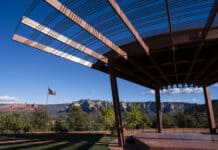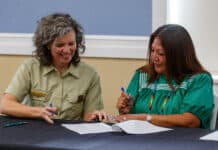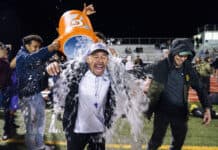Opening arguments began Tuesday, March 1, in the manslaughter trial of self-help author and motivational speaker James Arthur Ray as the prosecution and defense painted very different pictures of the man and how he conducts his business.
Ray, 53, turned himself in to the Yavapai County Sheriff’s Office in February 2010 after he was indicted on three counts of manslaughter.
The charges stem from an October 2009 incident at the Angel Valley Retreat Center south of Sedona that left three people dead after participating in a sweat lodge ceremony.
Lizbeth Neuman, 49, of Michigan, Kirby Brown, 38, of New York and James Shore, 40, of Wisconsin, died after sitting in the sweat lodge, a large tentlike structure heated to sauna-like temperatures as part of a $10,000-a-head weekend session organized by Ray and his organization James Ray International. Brown and Shore were pronounced dead that day; Neuman never regained consciousness and died after she was taken off life support days later. Around 20 others were injured.
Yavapai County Attorney Sheila Polk opened the prosecution’s case March 1 by playing a series of calls to 9-1-1 made from the retreat center the night of the tragedy.
 Pictures of the three victims were shown on courtroom television screens while the recording played, the first call from a woman who rushed to get to an area with cell phone reception, sounding frantic about sweat lodge participants who weren’t breathing.
Pictures of the three victims were shown on courtroom television screens while the recording played, the first call from a woman who rushed to get to an area with cell phone reception, sounding frantic about sweat lodge participants who weren’t breathing.
The prosecution also played recordings of Ray himself, made during the week leading up to the sweat lodge ceremony.
Painting Ray as a man who used his charisma to convince his clients to push themselves beyond reasonable limits, Polk played audio from the weeklong retreat where Ray told participants they could expect they would feel like they were going to die.
“It’s not whether you are going to physically die,” Ray told the group. “You are. The question is ‘how did you live?’”
Polk went on to describe a week where Ray played God, to the point where he told others he was God during an event called the “samurai game,” where some were asked to lie on the floor motionless as “dead” for hours for violating the rules.
“Most didn’t know what to expect,” Polk said.
Polk went on to describe a “vision quest,” an event where participants were taken out into the desert with a sleeping bag and a writing journal, split up and isolated for 36 hours without food or water.
A few hours after, the sweat lodge event began.
Right before the sweat lodge ceremony, Ray had some more words for those who were going to participate.
“You will feel as if you’re going to die. I guarantee that,” Ray said. “You will feel like your skin is going to fall off. When you emerge you’ll be a new person, like you’ve looked death in the eyes and overcome it.”
The sweat lodge ceremony lasted for a little over two hours, Polk said, and consisted of eight rounds of hot rocks being brought in to have water poured on them, driving the temperature inside the tent up and up.
Polk said some cried out in distress during the ceremony only to be ignored by Ray. Some people lost consciousness and were dragged outside by others, Polk said, while some left and others stuck it out in order not to disappoint Ray.
Polk said Ray was unprepared for a medical emergency, with only a limited first-aid kit on hand.
Defense attorney Luis Li didn’t dispute the deaths or injuries, but he painted the incident as a tragic accident.
Li said the prosecution greatly exaggerated Ray’s influence over participants and argued all of the people in the sweat lodge were adults capable of making their own decisions.
“The deaths … are a tragedy,” Li said. “Nothing anybody says in this courtroom, nothing is going to change that.”
As for the recordings of Ray speaking, Li said they were taken out of context, especially the one where Ray claimed to be God. Li said the “samurai game” was nothing more than a game similar to a corporate training exercise used by groups across the country.
Li said Polk misrepresented the facts when she said no one knew what to expect; he pointed to a waiver signed by all the participants which informed them about the “vision quest” in the desert and the sweat lodge ceremony.
 Li also said while the state was asserting Ray was exercising some influence over the participants forcing them to stay in the sweat lodge, other people left the lodge and even the seminar before the sweat lodge ceremony when they realized the activities weren’t for them.
Li also said while the state was asserting Ray was exercising some influence over the participants forcing them to stay in the sweat lodge, other people left the lodge and even the seminar before the sweat lodge ceremony when they realized the activities weren’t for them.
“If the state’s case is that [Ray] is so persuasive he can get people to act against their will, then he’s not very good at it,” Li said. “Because a lot of people left.”
Li also cast doubt on the actual cause of death of the three victims. While medical examiners attributed the deaths to heatstroke and exposure to temperatures inside the sweat lodge, Li said evidence
will indicate the victims showed none of the signs of heatstroke, including extreme dehydration and elevated body temperature.
Li said the defense would look into other possible causes of death never explored by the state and law enforcement, including the burning of treated wood to heat the rocks in the lodge and the possibility of contaminated soil or even the tarps and blankets used in and around the sweat lodge.
Li indicated several medical workers found no evidence of heatstroke the night of the incident and instead observed symptoms consistent with exposure to toxins and poison.
“The state only looked in one direction,” Li said.
Li also pointed out the sweat lodge had been constructed by the resort, not Ray, and it had been used for a few years without incident.
The trial is set to continue for the next several weeks. Judge Warren Darrow set aside more than 60 days for proceedings. Eighteen jurors have been selected to hear the case, 12 who will decide Ray’s guilt or innocence and six to serve as alternates.



















